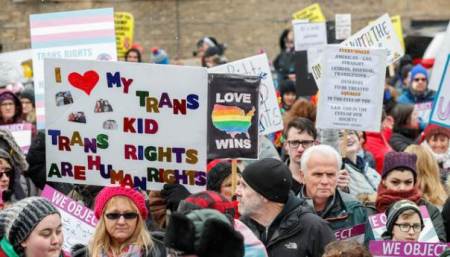Scholars Condemn Lack of Academic Freedom to Be Critical of Transgender Ideology

Over four dozen scholars in the U.K. are warning that academic and critical analysis of gender identity issues and transgenderism is being suppressed and censored.
Fifty-four academics who "represent a newly formed network of over 100 academics," most of whom are employed at universities across the U.K., published a letter in The Guardian on Tuesday to voice their concerns about governmental reforms being considered by the U.K. government to allow people to legally self-identify as members of the opposite sex.
In doing so, the scholars — ranging in expertise from sociology, philosophy, medicine and social work to political science, law, economics and more — aired their complaints about how they have faced an unusual amount of opposition for what they consider to be normal critical analysis of scientific and political assertions.
"We are also concerned about the suppression of proper academic analysis and discussion of the social phenomenon of transgenderism, and its multiple causes and effects," the scholars wrote in the letter. "Members of our group have experienced campus protests, calls for dismissal in the press, harassment, foiled plots to bring about dismissal, no-platforming, and attempts to censor academic research and publications."
According to the scholars, the opposition they have faced is "out of line with the ordinary reception of critical ideas in the academy." The scholars assert that "it is normally accepted that disagreement is reasonable and even productive."
The group also condemned the influence that LGBT political organizations are having when it comes to the limiting of academic freedom on college campuses.
"Many of our universities have close links with trans advocacy organisations who provide 'training' of academics and management, and who, it is reasonable to suppose, influence university policy through these links," the letter reads. "Definitions used by these organisations of what counts as 'transphobic' can be dangerously all-encompassing and go well beyond what a reasonable law would describe."
"They would not withstand academic analysis, and yet their effect is to curtail academic freedom and facilitate the censoring of academic work," the letter adds. "We also worry about the effect of such definitions on the success rates of journal submissions and research grant applications from governmental bodies such as the AHRC and ESRC."
The letter concludes by stressing that "it is not transphobic to investigate and analyze this area from a range of critical academic perspectives."
"We think this research is sorely needed, and urge the government to take the lead in protecting any such research from ideologically driven attack," the letter asserts.
The letter also explains that the scholars have submitted to Baroness Emma Nicholson in the House of Lords this week their concerns about the proposal to allow self-identification in the nation's Gender Recognition Act.
First on the list of signatories is Kathleen Stock, professor of philosophy at the University of Sussex. Stock recently published an op-ed titled "Why self-identification should not legally make you a woman."
"A range of structural inequalities between females and males are widely recognized. These material facts about female oppression must be acknowledged when we think about two questions at the heart of a bitterly disputed U.K. government consultation on reforming the Gender Recognition Act," Stock wrote.
"The first is whether self-identifying as a woman without medical certification should be sufficient criteria for legal gender reassignment. The second is whether self-identifying transwomen should be allowed into women-only spaces, and have access to women-only resources."
This summer, Stock came under fire from LGBT activists after she said in an interview that "trans women are still males with male genitalia."
"I emphatically deny that I am transphobic," she told PinkNews in July. "I vocally uphold the rights of trans women to be free of violence and discrimination, but I question whether the only way to protect trans women from violence is to allow trans women into female communal spaces."
"Violence against females is endemic," she added. "Trans women are biologically male, and though most are law-abiding, some small proportion are not. There is a general social need to continue to protect females in communal female-only spaces from the possibility of male violence."
Other signatories of the letter come from institutions such as the University of Oxford, University of Reading, Brighton and Sussex Medical School, University of Cambridge, University of London, King's College in London and the University of Liverpool.
The letter was also signed by a handful of scholars from prestigious schools in the U.S. Those include Burlette Carter, professor of law emeritus at George Washington University Law School in Washington, D.C.; and Alex Byrne, head of Linguistics and Philosophy Department at the Massachusetts Institute of Technology.
A full list of signatories can be found here.





















